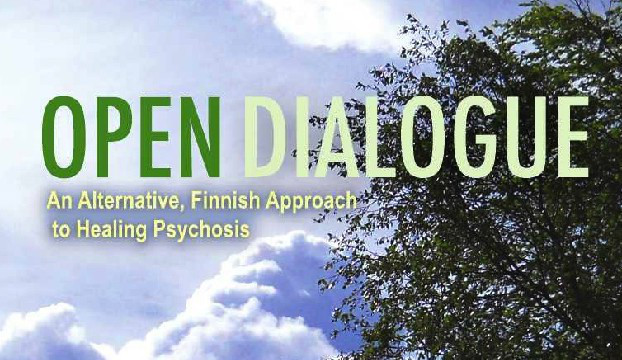A column published earlier this month by Psychiatric Services in Advance reports on the development and implementation of a patient-centered initiative based on Open Dialogue approaches. Though still a relatively new concept in the U.S.,the authors make a convincing case for the use of these dialogic practices. They present positive preliminary reactions, from both providers and patients, when used in inpatient units.
 Patient-centered care initiatives focus on increasing patient participation and engagement during their treatment by enhancing communication between providers and patients. This is particularly relevant in inpatient units, where power differentials between patients and providers are magnified. While patient-centered care initiatives have been around for over a decade and have been found to improve health status and patient satisfaction, they utilize approaches that still may be considered innovative in many settings.
Patient-centered care initiatives focus on increasing patient participation and engagement during their treatment by enhancing communication between providers and patients. This is particularly relevant in inpatient units, where power differentials between patients and providers are magnified. While patient-centered care initiatives have been around for over a decade and have been found to improve health status and patient satisfaction, they utilize approaches that still may be considered innovative in many settings.
The authors, affiliated with McLean Hospital in Belmont, MA, state, “The field of psychiatry emphasizes the therapeutic value of communication. However, the psychiatric provider community has been slow to implement more patient-centered approaches to care.”
Open Dialogue serves as a type of patient-centered care in psychiatry. Founded in Finland in the 1990’s, this system is an alternative to traditional mental health structures, and aims to enhance communication between patients and providers, therefore decreasing the loss of control a patient may experience in the mental health system.
Using different aspects of the Open Dialogue system, the researchers investigated whether these approaches would be feasible and effective in an inpatient unit outside of Finland – the Schizophrenia and Bipolar Disorders Unit at McLean Hospital. After using a dialogic approach to present and receive feedback regarding their implementation plans, clinical teams in the unit made several stylistic changes to how they conducted rounds. These patient-centered rounds were modified to include approaches such as providers discussing clinical assessments and plans in front of patients, as well as patients being asked to reflect on their providers’ comments.
The researchers collected staff, clinician, and patient responses to the initiative via questionnaires and in-person interviews. Although the researchers noted the need for further validation of outcomes, preliminary results were overall positive. The approaches seemed to work well with individuals experiencing paranoia and disorganization: there was an increase in efficiency for daily clinical activities, amongst other positive outcomes that providers felt were a direct result of the new modality.
This is not the first U.S. study based on Open Dialogue approaches that have yielded positive results. But while other studies have required a more significant institutional commitment to the Open Dialogue practices, this study, and its preliminary data show that a collaborative process, with brief training and institutional changes, made at no additional cost, can still lead to cultural shifts that affect positive results.
****
Rosen, K., & Stoklosa, J. (2016). Finland in Boston? Applying open dialogue ideals on a psychotic disorders inpatient teaching unit. Psychiatric Services in Advance. (Abstract)















The success of Open Dialogue is a function of treating mental distress as a social welfare problem rather than a medical problem; “inpatient therapy” is an oxymoron.
Report comment
I didn’t see in this article anywhere whether they followed the Open Dialogue practice of holding back from using antipsychotic drugs until much, much later. (and then in low doses for a much smaller percentage of people). To me this is a very crucial part of the Open Dialogue format. I hope ‘collaberation with patients’ means an absence of ‘forced treatment’ and truly ‘informed’ consent when medication is used.
Report comment
Is anyone besides me chilled by the following excerpt: “clinical teams in the unit made several stylistic changes to how they conducted rounds” I guess I’m stuck at the word ‘stylistic’ over say, ‘substantive changes’ I guess any modicum of respect given to my daughter is welcome from the usual arrogance and lack of transparency from clinicians making their rounds but Jeesh. Is this really the same as a true collaborative approach represented by Open Dialogue? If they are still harboring a ‘my way or the highway, attitude and using the same old medical approach of ‘label and medicate’ for any negative emotion my daughter exhibits, as opposed to say, reflecting on context, history, trauma, etc. what is the point? Anyone?
Report comment
Open Dialogue “Light,” maybe?
Report comment
Hi Madmom,
you are raising a profoundly important issue. Does this initiative represent a genuine commitment to trying the Open Dialogue approach (as one would hope) rather than mouthing the words but continuing mostly on a business-as-usual basis? After Robert Whitaker put the psychiatric establishment on the defensive, there is more pro forma commitment to reform (mouthing platitudes about “judicious” or “minimal” use of psychiatric drugs even as they pile on the antipsychotics) but the substance is often or mostly not there. Mainstream psychiatrists want to reassure themselves that they are “with the program,” on top of everything and that they do not harm patients (even Lieberman reinvented himself and his colleagues are caring, holistic souls)— hence the “minimal use” claims, but I doubt whether they are really walking the walk. Of course, one should not underestimate the professional and legal risk associated with avoiding or minimizing drug use, and kudos to those brave, enlightened psychiatrists who are listening to patients and working with them to avoid or discontinue psychiatric medications.. Having said all this, on the whole, I see reports such as this one as positive developments, but no one’s word should be taken for anything and questions such as those that you raise should continue to be raised and actual practices scrutinized and critiqued.
Report comment
I can’t get my head around the fact that it’s being conducted in a hospital setting, not the home. (Totally agree with your “stylistic” objection.) I didn’t see any mention of parents and family involvement. The point of meeting people on their home turf is to understand the situation better and to not scare people with “clinical” treatment. OD is family focused and takes the “otherness” off the patient, or at least that’s the idea. This isn’t Open Dialogue, it’s simply trying to look “open” to change.
Report comment
I echo some of the thoughts above. This isn’t Open Dialogue, it’s just tinkering around the edges of conventional psychiatry and trying to make it look pretty. What next? Tinsel decorations on the ECT machines?
Report comment
The patients/people are in a prison that the jailers call “inpatient units”. What are you in prison for? Shouldn’t you compliment your jailers for helping you? ( before you commit your crime)
” where power differentials between patients and providers are magnified. ” LOL Who is in prison and who isn’t? Can you tell the difference? If you can you are not getting enough drugs.
Report comment
Interesting that they felt that talking to patients about their assessments is a change in “style.” It seems like a very radical change in values to me.
— Steve
Report comment